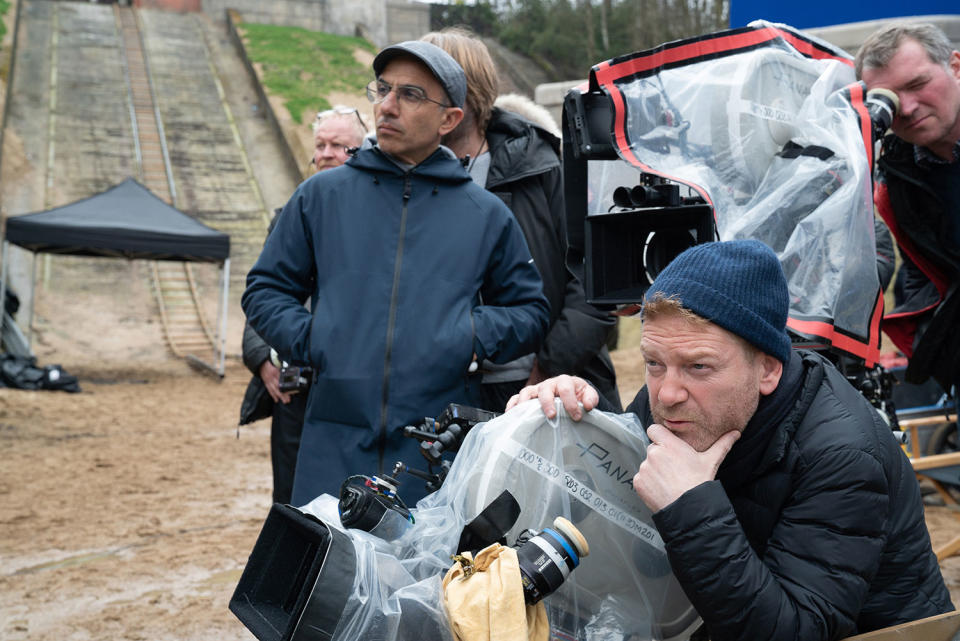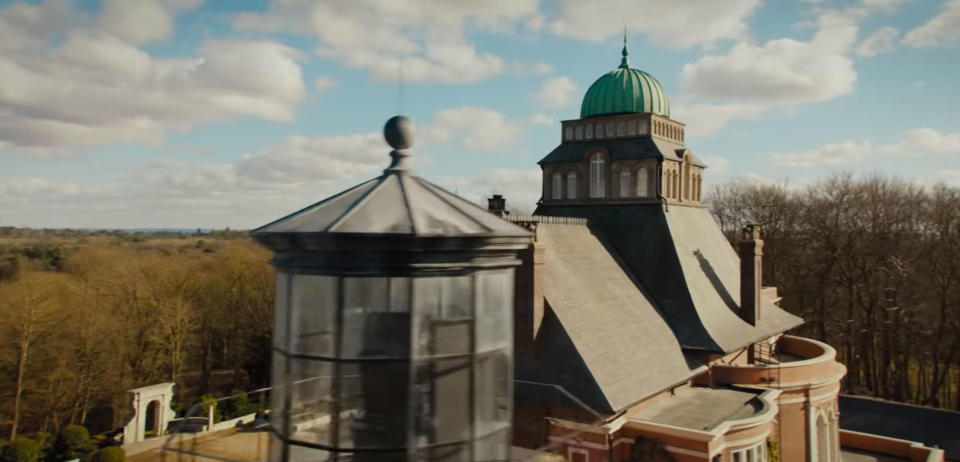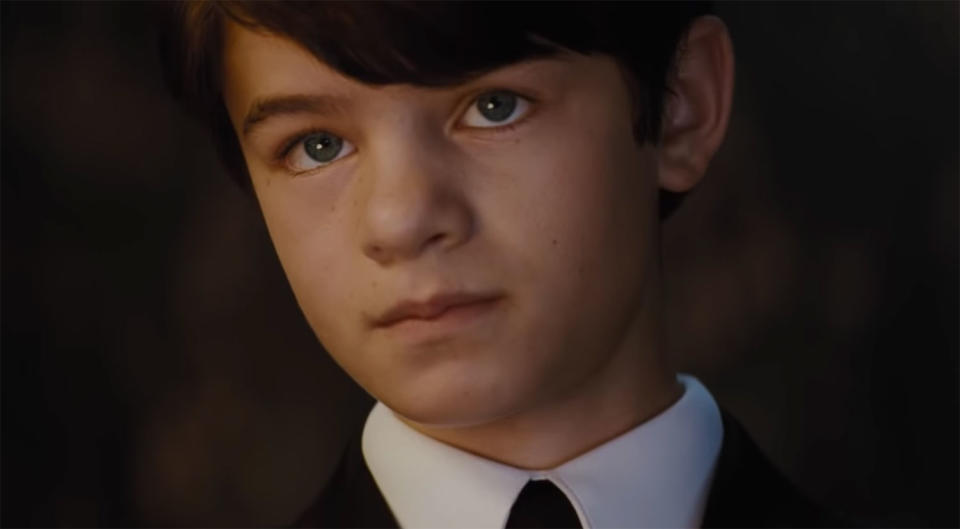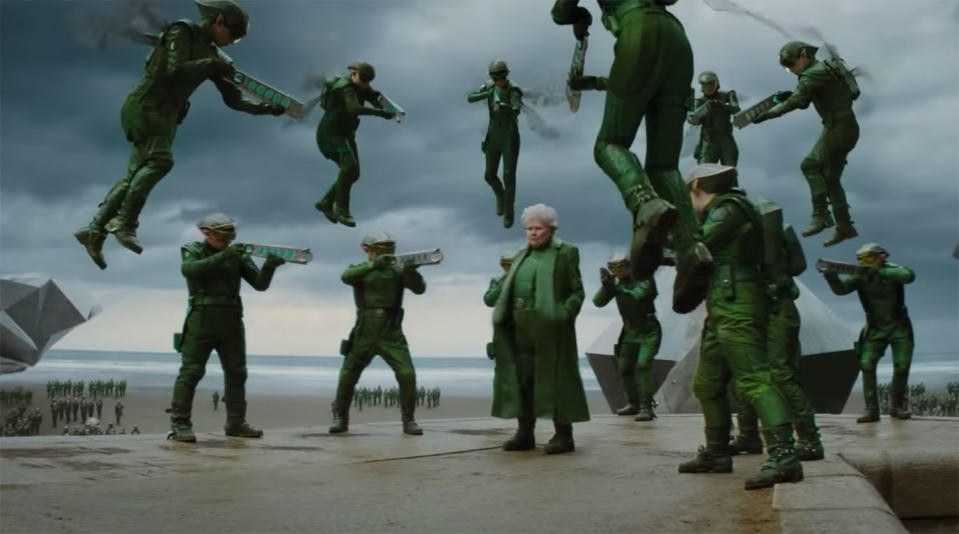'Artemis Fowl': Kenneth Branagh on why Judi Dench's character was gender-flipped for the Disney adaptation

Appearing right in the middle of Disney’s absurdly loaded 2019 slate, nestled between major sequels (Toy Story 4, Frozen 2), jostling for space among pumped-up superhero adventures (Avengers 4, Captain Marvel), and standing alongside the studio’s huge live-action remakes (Lion King, Aladdin, Dumbo), is the anomalous Artemis Fowl, and the first teaser has just dropped (watch below).
Based on the series of hit teen novels by Irish author Eoin Colfer, it’s a brand-new IP for the hit-making studio, and Disney has enlisted its top man for world-building franchise starters: Kenneth Branagh.
Having laid the foundations for the Marvel Cinematic Universe with Marvel Studios’ make-or-break Thor and initiated the studio’s live-action remake cycle with Cinderella, Branagh was the perfect filmmaker to get this Harry Potter-challenging fantasy epic off the ground.
Artemis Fowl, played by Irish newcomer Ferdia Shaw, is a boy genius. He comes from a line of criminal masterminds, and when his father mysteriously disappears, he must go on an epic journey of discovery that takes him beneath the ground we walk on into the realm of the fairies to uncover the truth.
Branagh’s film is a largely faithful adaptation of the first book, originally released in 2001. It was described at the time as “Die Hard with fairies” thanks to a magical siege that takes place in Fowl Manor, the coastal pile that’s been home to the Fowls for generations. One major difference between the books and the film is in the casting of fairy commander Julius Root.
Branagh has flipped Root’s gender, casting his Murder on the Orient Express co-star Judi Dench in the part written as a man in Colfer’s novels, based entirely on what he describes as an “uninformed hunch.”
“I’ve worked with [Dench] many times now,” Branagh explained during a break in production back in April, “and there was just something that the great theater director Peter Brook refers to as the ‘uninformed hunch,’ and so the uninformed hunch is that whenever I ask Judi to do something she says ‘Is it different?’”
In the film’s first trailer (above), you can hear Dench’s performance is different, and unlike anything she’s ever done before. Branagh describes her performance as “Napoleonic,” and the filmmaker says he likes to remind the 83-year-old acting titan of her desire to be “different” in her moments of uncertainty on set.
“It sounds quite unlike anything you’ve ever done, you look quite unlike anyone you’ve ever looked like, and I knew that would appeal to you.”
Here’s everything we learned from Branagh about his take on Artemis Fowl, gleaned from a conversation in the library of Fowl Manor, which has been built for real to last through a possible eight-film shoot at Longcross Studios just outside of London.
The book has been described as “Die Hard with Fairies”, is that what you’re going for with this?
Well, it’s definitely a book with a siege at the heart of it, and as you’re probably aware, we’re starting that process today, with a troll hammering its way into the house, and the beginnings of seeing whether the brilliant Artemis Fowl, who’s able to translate fairy books through his intelligence and his imagination, can, in combination with Holly Short [Lara McDonnell], stop it.
One of the things I think that Eoin [Colfer] really did so well, and one of the things I wanted to encapsulate … sometimes at the beginning of a process like this, my distinguished colleagues at Disney, who I get on very well with, will sort of invite you to say, “What’s your take on it? What’s your great idea?”
And my great idea was to copy Eoin Colfer, and to not get in the way. So I hope, for instance, that the film, like the book and books, is very rapid, very punchy, and pacy. I think one of the ways in which he manages to keep us very intrigued by a series of beautifully improbable things — unless we have a lot of people who believe in fairies here? Maybe we have, clap your hands if you do of course — is that he moves at a pace which means that you just, even if as it were you disagreed with the conception, you are thrilled by the execution.
And so I didn’t at all disagree. Who am I to say what’s out there or indeed under our feet in Ireland?

But, we move rapidly and I think both the humour and, as always in things that I’m drawn to, the humanity and the emotion underneath it all, I think moves very lightly.
As I get older, I’m a fan of shorter and shorter movies. Maybe that’s a bladder issue, I don’t know? But having inflicted very long viewing experiences on people, and having to answer questions, like people like you might have asked me years ago when I made our film of Hamlet, and journalists would say to me “and so, this is yet one more Hamlet, what’s yours about?” and I’d say “it’s about four hours”.
I decided that after that, that I would probably… that ninety minutes… I don’t know if you ever do this, there are some great lists out there on the interweb, of great ninety minute movies, but I often, especially when making a movie like this, that’s what I’ll try and do of an evening, I’ll try and watch a ninety minute classic and see how master filmmakers did things swiftly.
I think Eoin Colfer does so in the books and that’s what we’re trying to do here. Not rushing, but simply celebrating the swiftness of thought, which is characteristic of the Irish, of him, and indeed of his central character.
Did you consult Eoin much?
We’ve talked a little. I mean, not a lot, but very warmly and very happily, and he was here this week. He was here a couple of weeks ago. I mean it was wonderful to see his face when he walked into this place. As you know, it’s taken a while, these things always do, or often do.
And he’s been very good. We told him about … a few [plot changes] with the translation of a book into a film … and the first thing he said was, “God, I wish I’d thought of that!”
He said, “I’ll certainly put it into the reissue!” So he’s been very collaborative like that.
Can you talk about how much the second book is influencing this movie?
There’s a little bit of it heading back in but we’re trying to hold as much of the first book in its entirety as possible. We’re trying to lay out what may be skews on it, in future stories, but essentially we’re trying to serve this first one with, I suppose, an anchoring emotional pull that comes a bit from the second book, which is that Artemis’s father is missing.

And so the search for a father, and the search for family, and the reunion of family is, if there are only 6 or 7 stories ever told, that’s definitely one of them. So it provides a way, I think, for us to do what I feel is important in a first film which is for us to, aside from admiring or being thrilled by his intelligence, and his ability to think swiftly and imaginatively, we’ve also got to like him and feel for him.
And in a way, this is a sort of I suppose, it’s a – who know if we make another one – but if it’s an origin story, we had this issue with Thor. When we did the first Thor movie, was just to try to find a way to offer a complete dish. That’s all we were making, that’s all we’re making now, we’re talking about other stories, but the public will decide that.
We know Eoin’s done them, but we’re planning for this one, and for this one to feel as if it has an emotional satisfaction and delivery, and so family becomes central to that.
You’ve gone from Murder on the Orient Express to Artemis Fowl – what was the decision there?
Artemis has been something I’ve been developing since, for three years now actually. My nephews are here today, and they were both reading Artemis Fowl four years ago. We were all on holiday together and they said, “You should have a look at this,” and then about three weeks later, Sean Bailey rang up and said, “Have you ever heard of Artemis Fowl?” And I said, “I’ve just read the first book!”
And so there have been some scripts and versions and developments up to that point, and they said, ‘Would you be interested in taking it on?”
Everybody knew that although there’s something brilliant at the centre of it that Eion’s done, that translating it into film was challenging. So, it’s taken quite some time. It’s taken quite some time to find the balance between humour and emotion and magic and the contemporary world.

[The world of Fowl Manor, Artemis’s family home, is] an imaginative place. It’s a bonkers place. Fowls, generation after generation, … have brought all these additional ideas, but they’re ideas to do with imagination and invention. It’s not necessarily to do with the acquisition of lands and money, or the desire to be separate and distinct.
We introduce our Artemis at a real school, like the school the kids who’ll be watching this film will be seeing — he’ll look like a kid who could be in their school.
It took a long time to find a way to do what we believed was that tone. [Meanwhile, as I was developing the script at one studio, I was shooting Orient Express very nearby.] So, … the train was at a station just across the way, and [every day] there was a moustache lying on the make-up table in the morning, and we had the chance to do that.
But we’ve been working on it, draft after draft after draft. What Eoin does is some things very beautiful and very simple, and that takes a long time to get to. It took him a long time, and it’s taken us a long time.
Can you talk about your casting choices, specifically the lead role, as it sounds like you saw every young person in the whole of Ireland for the part?

It was just like Thor. I reckon we saw about as many people, and it took months and months and months. We wanted to find someone, if we could, who was Irish, because we’re trying to allow that to be a distinctive flavour here, just without effort, but with some reality.
And then we needed to find somebody who was not going to be overwhelmed or intimidated who could see it for the beautiful opportunity it is, and the fun that it is.
I said to Ferdia a trillion times, “We’re just making this film — don’t get all worked up about stuff. It’s all fine. We’ll go to work today, we’ll see what happens, I hope we make a good film and I hope it’ll be a nice time. … Don’t worry about the pressure.”
A beautiful moment in the life of the movie was when I took him round the house for the first time. I came in here, it can be a bit overwhelming, so I just came in with me and him, brought him up the stairs, and he just went, ‘Oh wow, bloody hell.”
And then we got into his room and he looked at the books and he said, “God, I’ve read all of these!” I said, “I know, you told us you had, that’s why they’re there!”
Whose decision was it, or how did it originate, to have Judi Dench play Root, because that’s obviously a big change from the books?

Well, I’ve worked with her many times now, and there was just something that the great theatre director Peter Brook refers to as the “uninformed hunch,” and so the uninformed hunch is that whenever I ask Judi to do something she says, “Is it different?”
And when she first started … she went [makes deep grumbling noise] and then she started walking round the the room. She didn’t say anything, she just threw the odd line out. A line that she loved from Root was “Knock it off!”
So she just started doing this, and then her hand went round behind the back, and I thought, “Christ, she looks like Napoleon, or Churchill, or somebody.”
And then she turned into this 6-year-old: “Do you think that’ll be any good?” I said, “That’ll be good! That’ll be really good, keep that!”
You made Thor, early in the Marvel Cinematic Universe, what did that film teach you about world-building that you were able to use in this film?
Well, that it’s exciting, but that it’s a little scary. I think when it comes to something like this and you’re talking about the many, many types of fairies, elves, sprites, trolls, goblins, that live under the earth, and at the same time you’re looking to have a very sort of contemporary feeling, a modern world that embraces technology and embraces potentially quite advanced technology, that experience allowed me to not feel so intimidated by it.
Although it continues to be a pleasant creative, scary thing. I think you are aware that somehow, somewhere you are out there with those sorts of combinations. We all feel it, I think we all feel it, because it’s a huge, huge, huuuge team effort, and it’s great that you’ve met so many people who are so critical to it.
Thor was an experience, that once you’ve been in the world of frost giants and blue planets, and stuff like that, and an enormous blond Australian person lands in New Mexico, and takes his shirt off in front of a scientist, I don’t know of anything else that is such a conundrum. So then it isn’t so weird to have your one-wheeling 13-year-old Irish boy summon up ancient Celtic spirits to potentially prevent a troll attack on your house.
We’ve all been there, haven’t we? We’ve all done it, so…
It was good grounding in embracing the different, the imaginative and the exciting and knowing that it’s creatively scary but that’s the only place to be. And on that note … I’ll go and have a creatively scary lunch.
Artemis Fowl is in cinemas August 2019.
Read more
Lion King breaks trailer record
Watch the first Artemis Fowl teaser
Mary Poppins Returns set visit report

 Yahoo Movies
Yahoo Movies 

